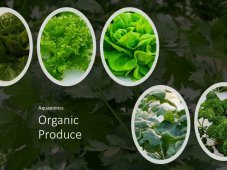Are aquaponics organic?
‘Aquaponics’ refers to a process in which plants and seafood are grown concurrently in the same system. Growers use the waste by-products, similar to how an organic soil farmer would use manure to fertilize their crops, that accumulate in the water from the seafood to feed plants, which are often also marketed for human consumption. Once the nutrients have been filtered by the plants, the water is then reused by the aquatic animals, often termed a ‘closed-loop’ system. This process of growing plants without soil in aquatic systems dates back thousands of years. It picked up steam again in the 1970s once the appropriate modern agricultural technology became available.
Under USDA organic regulations, the certification of aquaponic produce is allowed, and the National Organics Program (NOP) does not prohibit products grown with these techniques from being labelled organic.
In Egypt, the organic law only came in 2020 and yet to have executive regulations that organizes the detailed terms and conditions for a product to be labeled as ‘organic’.
Based on the definition of ‘Organic‘ alone, it is clear that aquaponics systems can be labeled organic, as long as they meet the governmental requirements. However, the regulations of organic production should be observed.
How Are Aquaponics Organic?
According to the USDA, the line between organic and non-organic, based on definition, is pretty clear. In theory, aquaponics meets those standards as a growing method. However, there are always exceptions in which an aquaponics practitioner could employ some unapproved growing practices, which could inhibit this classification. In general, here are the reasons why aquaponics are considered organic:

- Doesn’t use synthetic fertilizers
- Employs chemical-free pest control
- Has less environmental impact
- Doesn’t use growth hormones and antibiotics

